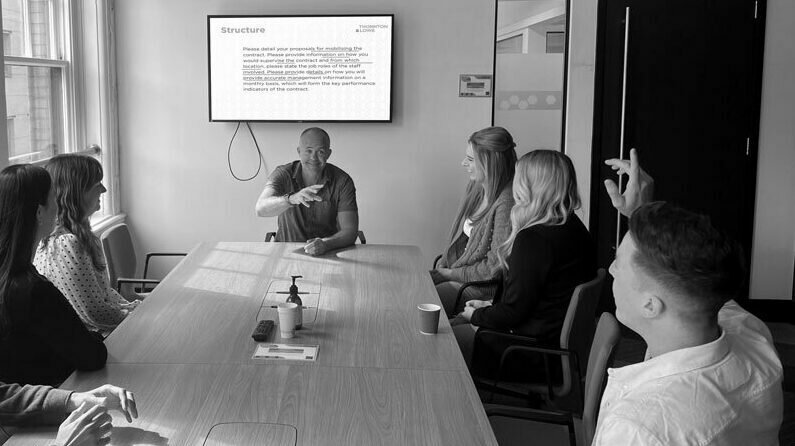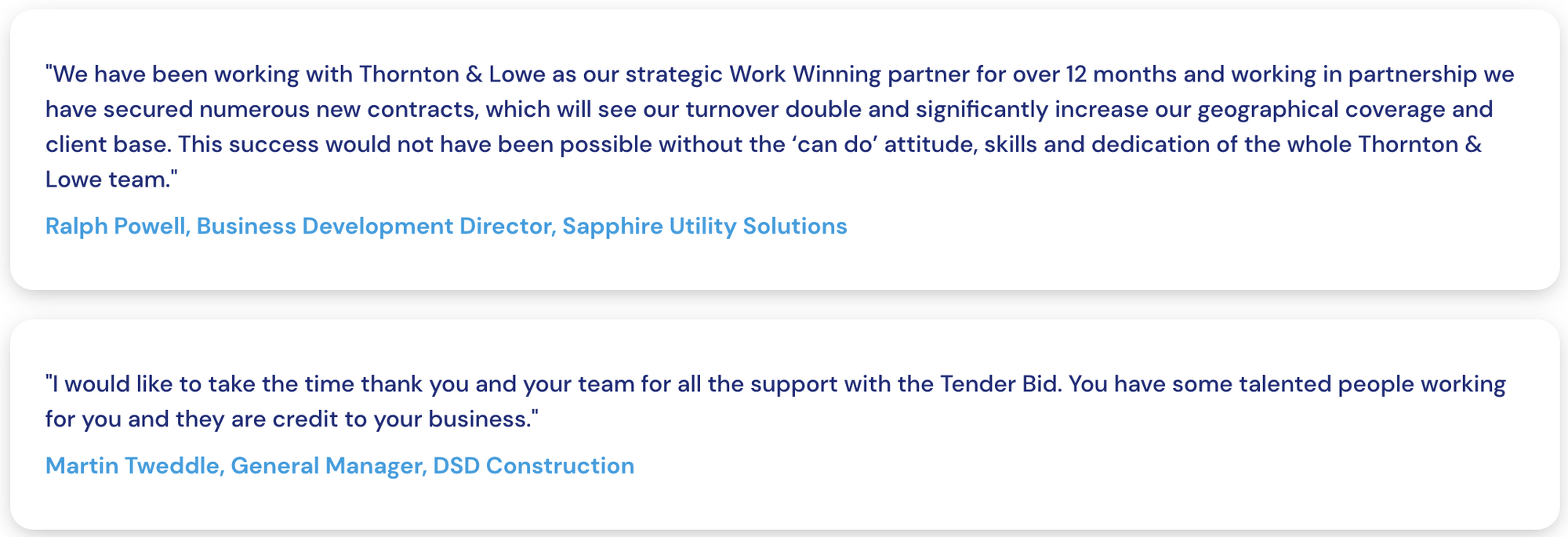Procurement Tendering
If you've googled "procurement tendering," chances are you're a supplier looking to win new business. Perhaps you've heard about the opportunities available through tendering but find the whole process a bit bewildering. You're not alone.
Tendering can seem like a world of jargon, strict rules, and mysterious evaluation methods. But once you understand the basics, it becomes much more approachable – and potentially very rewarding for your business.
Understanding the Basics
At its heart, procurement tendering is simply a formal way for organisations to find suppliers. When a company or public body needs something – whether that's office furniture, IT support, or a new building – they often use tenders to find the best supplier.
For you as a supplier, it's an opportunity to win valuable contracts that can provide steady income and help your business grow. Some of the biggest advantages include longer-term relationships and the chance to work with established organisations that might otherwise be difficult to reach.

Don't know where to start?
Book a free consultationFinding the Right Opportunities
The first challenge many suppliers face is simply finding relevant tenders to bid for. The good news is there are plenty of places to look.
For public sector opportunities, the UK government's Contract Finder website lists contracts worth over £10,000. Larger contracts appear on the Find a Tender service, which replaced the EU's TED system after Brexit. Many local councils also publish opportunities directly on their websites.
If you're after private sector tenders, industry-specific portals often list relevant opportunities. There are also paid tender alert services that can notify you when suitable tenders appear – these can save you time but come at a cost. Speak to one of our bid consultants today! We have Tender Pipeline which offers free tender alerts covering all these portals and we can advise on private sector tenders.
The trick is to be selective. Bidding takes time and resources, so focus on opportunities that truly match your business capabilities and goals. One construction company owner told me: "We used to bid for everything remotely relevant. Now we're much more selective, and our win rate has gone from about 10% to almost 30%."

Getting to Grips with Tender Documents
When you find a promising opportunity, you'll face a set of documents that might initially seem overwhelming.
The main document is usually called the Invitation to Tender (ITT). This explains what the buyer wants and how the process works. Alongside this, you'll typically find a detailed specification, evaluation criteria explaining how your bid will be scored, terms and conditions, and response templates.
Take your time with these documents. Read everything carefully before deciding whether to bid. Check if your business can realistically meet all the requirements and if the contract aligns with your capacity and expertise.
Creating a Bid That Stands Out
Writing a winning bid is part art, part science. The most successful bids directly address what was asked, provide concrete evidence of capabilities, and clearly explain the benefits to the buyer.
A common mistake we see is suppliers talking all about themselves too much! Your bid needs to be about the buyer and how you'll solve their specific problem. It's a company brochure or marketing document!
When writing your bid, stick closely to the format requested. Answer each question directly and back up your claims with evidence from previous work. Be clear and concise, avoiding unnecessary jargon. And always leave time for thorough proofreading – errors suggest carelessness and reduce your credibility.
Time management is so important. A rushed bid is rarely a successful one. Our Tender Library software helps businesses bid more efficiently but the key is proper planning.
Improving Your Success Rate
Like any skill, tendering improves with practice. Every bid, whether successful or not, offers valuable learning opportunities.
Always ask for feedback on both unsuccessful and successful bids - as there is always room for improvement. This can be really useful guidance and you can build this advice into your bid reviews to ensure you next bid is better!
Many successful companies build a bid or tender library, saving responses that worked well so they can adapt them for future opportunities. Some invest in training for their team or start with smaller, less competitive tenders to build experience before targeting bigger contracts.
For larger opportunities, consider forming partnerships with complementary businesses. This lets you combine strengths and resources, potentially opening doors to contracts that would be out of reach individually.
Remember that tendering is partly a numbers game. Even the most successful companies don't win every bid, so persistence is key.

The Other Side of the Fence: Understanding Buyers
To improve your chances of success, it helps to understand the process from the buyer's perspective.
Buyers aren't just looking for the cheapest option. They want value for money, which means balancing cost against quality, reliability, and risk. They need to ensure suppliers can meet regulatory requirements and increasingly look for additional social value – ways your contract delivery can benefit the wider community.
The procurement process typically starts with buyers identifying what they need, sometimes consulting suppliers informally before creating tender documents. After publishing the opportunity, there's usually a period for questions followed by bid evaluation, award decision, and contract implementation.
FAQs: Insights from Buyers
When talking to procurement professionals, certain questions come up repeatedly. Here's what buyers want suppliers to know:
What makes a bid stand out? Bids that clearly show understanding of specific needs get noticed. Generic responses rarely win. Successful suppliers directly address the buyer's challenges and demonstrate relevant experience with concrete examples.
What mistakes should suppliers avoid? Not following instructions tops the list. When buyers ask for specific information in a particular format, ignoring these requirements suggests the supplier might be difficult to work with. Word limits exist for a reason – respect them.
Is it acceptable to contact buyers before submitting? Use the formal clarification process if you have questions. This ensures all suppliers receive the same information. Cold calling procurement staff outside this process is rarely welcomed and may breach procurement rules.
How important is price? Price matters, but rarely in isolation. Buyers look for value for money, which includes quality, reliability, and risk. An unrealistically low price raises concerns about whether you understand the requirements or can deliver sustainably.
What causes immediate rejection? Late submissions are almost always rejected immediately. So are bids missing mandatory information or those not meeting minimum requirements. Bids showing evidence of collusion or inappropriate contact with staff also face rejection.

How Thornton & Lowe Can Support Your Tendering Success
Your procurement tendering doesn't have to be a solo journey. At Thornton & Lowe, we've helped countless businesses transform their approach to tendering and dramatically improve their win rates.
Free Initial Consultation
Not sure where to start? We offer a free, no-obligation consultation to understand your business needs and recommend the most appropriate support. During this session, our experts will assess your current tendering capabilities and identify key areas for improvement.
Bid Mentor Service
For businesses looking for ongoing guidance, our Bid Mentor Service starts from just £750 per month. This provides you with regular access to a dedicated bid expert who will:
- Create a personalised tendering roadmap for your business
- Ensure you're making consistent weekly progress
- Review your bids before submission
- Help build your company's tendering capabilities
- Provide feedback and advice when you need it most
"Having a bid mentor has transformed our approach," says Martin Edwards, Managing Director at Edwards Engineering. "We now have a structured process for each bid, and someone to turn to when we're not sure about something. It's like having an experienced bid director without the full-time salary."
Comprehensive Training Solutions
Knowledge is power in the tendering world. Our training programmes include:
- Regular bid writing courses delivered across the UK
- Bespoke in-house training tailored to your specific industry and needs
- Workshops focusing on particular aspects of tendering, from technical writing to pricing strategies
- Ongoing support to implement learnings from training sessions
Our courses combine theory with practical exercises, ensuring you leave with skills you can immediately put into practice.
Flexible Bid Writing Services
Whether you need occasional help or a complete solution, our bid writing services adapt to your requirements:
- Fully outsourced bid management and writing for businesses without internal resources
- Ad-hoc support during busy periods or for particularly important bids
- Review services to elevate bids you've created in-house
- Emergency assistance for tight deadlines
Our experienced bid writers have worked across sectors from construction to healthcare, IT to facilities management, bringing both writing expertise and valuable sector insights.
Tender Search and Selection
Bidding for the wrong opportunities wastes precious time and resources. Our search and selection service:
- Monitors tender portals across the UK and beyond
- Identifies opportunities matching your specific criteria
- Assesses each tender's suitability for your business
- Provides regular reports of recommended opportunities
- Helps you focus on bids with the highest win probability
Bid Design and Administration
First impressions matter. Our design team ensures your bids look as professional as they sound, while our administration support handles the time-consuming aspects of bid preparation:
- Creating visually impressive bid documents that stand out
- Developing branded templates for your future use
- Managing document compilation and formatting
- Handling online portal submissions
- Ensuring all compliance requirements are met
As a consultancy built around bid writing services, we understand that each business has unique needs. Our modular approach means you can access precisely the support you need, when you need it, making professional bid assistance accessible regardless of your company size or experience level.
Ready to transform your tendering success? Contact us today to arrange your free initial consultation and discover how Thornton & Lowe can help your business win more and better contracts.

Moving Forward
Procurement tendering offers significant opportunities for suppliers willing to learn the process and prepare thoroughly. By understanding buyers' perspectives and following best practices, you can greatly improve your chances of success.
The effort required for tendering may seem daunting initially, but the rewards – stable contracts, predictable income, and business growth – make it worthwhile for many businesses.
As you embark on your tendering journey, remember that each bid is a chance to refine your approach. With persistence and attention to detail, you can turn the complex world of procurement tendering into a valuable source of business growth.
Looking for more guidance on your tendering journey? Our experts can review your bids and provide personalised advice. Contact us to learn more.





